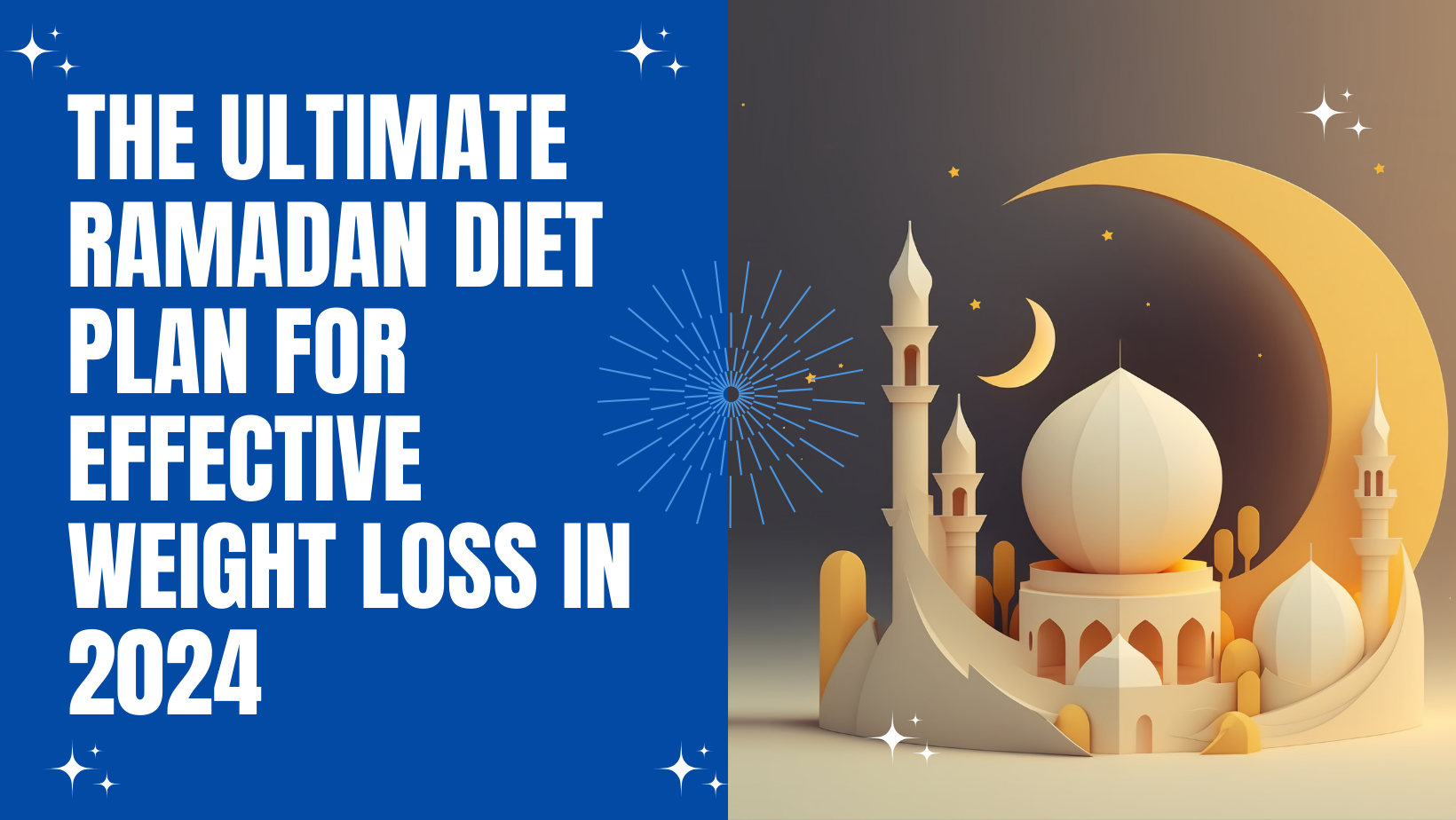When developing the Ramadan diet plan for weight loss strategies in the year 2024, allowance should be made for both the traditional practices and the very best of nutritional knowledge and trends. More often, the goal of the diet is lost between the religious requirement of fasting and the impact of the food on the human body. This will involve making sure that the meals eaten before dawn or before the break of the fast and after breaking the fast all contain nutrients; one is mindful of his/her water intake and the eating habits. By consuming more of the foods that have high fiber content, lean protein and good fats, it is possible that motivation and hunger will be maintained all day. Indeed, Muslim people who want to lose weight will benefit significantly from the well-balanced diet plan for Ramadan since great importance is paid to the spiritual aspect of the holiday.
Table of contents
- How Fasting helps You Lose Weight?
- Introduction to Ramadan and Its Significance
- Understanding the Basics of Weight Loss during Ramadan
- Planning Your Meals: Preparing for Success
- Optimal Foods for Suhoor (Pre-dawn Meal)
- Exercise and Physical Activity During Ramadan
- Medicines and Vitamins to Support Weight Loss
- Managing Stress and Sleep for Weight Loss Success
- Conclusion
- FAQs
How Does Fasting Help You Lose Weight?
Although fasting is generally associated with weight loss, most people are usually unaware of the physiological processes that occur in the body once fasting is initiated. In periods of fasting, your insulin concentrations are low, and your body uses fat for energy production. Popularly known as ketosis, this process results in appropriate fat loss for weight loss. Also, fasting can assist in the management of hunger associated with hormonal patterns implying that energy intake is low. Also, restricted eating helps increase metabolic rates, which means the shedding of more calories. However, the idea of weight loss is not the only benefit of fasting in Ramadan; as has been pointed out, there are many advantages of fasting in Ramadan, such as spiritually, improvement in mental health, and improvement in body health.But to improve your fasting regime in Ramadan, there is Ayurvedic Weight Loss Medicine that can be taken its cure also helps in losing weight in a natural way and has no side effect because it’s an ayurvedic product.own as ketosis, leads to efficient fat loss and weight reduction. Additionally, fasting can help control hunger hormones, leading to decreased calorie intake. Moreover, fasting may boost your metabolism, promoting greater calorie expenditure. Beyond its impact on weight, fasting during Ramadan offers additional benefits of fasting in Ramadan, including spiritual growth, mental clarity, and improved overall health. And to boost your weight loss journey in Ramadan you can add Ayurvedic Weight Loss Medicine in your routine which will help you lose weight quickly and naturally, as it is a Ayurvedic product hence have No Side Effects.
Introduction to Ramadan and Its Significance
- Ramadan, the holiest month in Islam, is marked by fasting, prayer, reflection, and spiritual growth.
- Ramadan diet plan for weight loss becomes a focus, prompting a reevaluation of dietary habits.
- Fasting from dawn until dusk encourages self-discipline and empathy towards the less fortunate.
- Observing Ramadan fosters community and solidarity among Muslims globally.
- Breaking fasts and sharing meals with loved ones strengthens bonds and reinforces values.
Understanding the Basics of Weight Loss during Ramadan
- Understanding the basics of weight loss during Ramadan is essential for achieving your Ramadan diet plan for weight loss goals effectively.
- Fasting during Ramadan alters the body’s metabolism, necessitating a focus on balanced nutrition.
- Prioritize nourishing the body with wholesome foods during suhoor and iftar.
- Create a personalized meal plan that includes nutrient-dense foods and mindful portion control.
- Support your weight loss journey while honoring the spiritual significance of Ramadan.
Planning Your Meals: Preparing for Success
- Plan Ahead: Devote time to crafting a Ramadan diet plan for weight loss tailored to your preferences and nutritional needs.
- Balanced Nutrition: Ensure your meals include a mix of carbohydrates, proteins, and healthy fats to sustain you throughout the day.
- Fiber-Rich Foods: Prioritize foods high in fiber, such as whole grains, fruits, and vegetables, to promote satiety and regulate digestion.
- Protein Power: Incorporate lean sources of protein like chicken, fish, beans, and lentils to maintain muscle mass and support metabolic function.
- Hydration Strategy: Hydrate adequately during suhoor with water, herbal teas, and hydrating foods to prevent dehydration during fasting hours.
- Portion Control: Practice mindful eating and portion control to avoid overindulging during suhoor and iftar, supporting your weight loss goals.
Optimal Foods for Suhoor (Pre-dawn Meal)
- Ramadan diet plan for weight loss Optimal foods for Suhoor, the pre-dawn meal, play a crucial role.
- Incorporate high-fiber options such as oatmeal or whole grain bread to sustain energy and promote fullness throughout the day.
- Choose protein-rich foods like eggs or Greek yogurt to maintain muscle mass and prevent excessive hunger during fasting hours.
- Include hydrating foods like fruits and vegetables, along with plenty of water, to prevent dehydration during fasting.
- Selecting nutrient-dense foods for Suhoor supports weight loss goals while nourishing the body for the fasting period ahead.
Exercise and Physical Activity During Ramadan
- Incorporating regular exercise into your routine can enhance the effectiveness of your Ramadan diet plan for weight loss.
- Choose optimal times for workouts, such as before iftar or after taraweeh prayers, to maintain energy levels.
- Activities like brisk walking, yoga, or bodyweight exercises can aid in calorie burning and muscle preservation during fasting.
- Consistency is key; aim for a balanced approach to exercise throughout Ramadan.
- Listen to your body’s signals and adjust your workout intensity accordingly to avoid overexertion during fasting hours.
Medicines and Vitamins to Support Weight Loss
- Vitamin D: Essential for metabolism and energy production, vitamin D supplementation can support weight loss efforts during Ramadan by ensuring adequate nutrient intake despite restricted eating hours.
- Omega-3 Fatty Acids: Incorporating omega-3 medicines can help reduce inflammation, support heart health, and promote satiety, making them valuable additions to a Ramadan diet plan for weight loss.
- Probiotics: Maintaining gut health is crucial during fasting, and probiotic medicines can aid digestion, improve nutrient absorption, and support overall well-being while adhering to a Ramadan diet plan for weight loss.
- Consultation: Before adding any medicines to your regimen, it’s essential to consult with a healthcare professional to ensure safety and effectiveness, taking into account individual needs and fasting practices during Ramadan.
Managing Stress and Sleep for Weight Loss Success
- Ramadan diet plan for weight loss should include nutrient-rich foods that provide sustained energy throughout the fasting period.
- Incorporating whole grains, lean proteins, fruits, and vegetables into your can help maintain satiety and prevent overeating during iftar and suhoor.
- Hydration is key in a , so be sure to drink plenty of water during non-fasting hours to stay hydrated and avoid mistaking thirst for hunger.
- Avoiding fried and sugary foods in your Ramadan diet plan for weight loss can help reduce calorie intake and support your weight loss goals.
- Consistency is essential in following a , so stick to your meal schedule and avoid excessive indulgence during iftar and suhoor.
Conclusion
In conclusion, crafting the ultimate Ramadan diet plan for effective weight loss in 2024 requires a harmonious blend of tradition and modern nutritional science. By prioritizing nutrient-rich foods, maintaining hydration, and practicing mindful eating habits during suhoor and iftar, individuals can achieve their weight loss goals while honoring the spiritual essence of Ramadan. Additionally, integrating medicines like iVate Ayurveda weight loss capsules can provide natural support for enhanced results. With this holistic approach, individuals can embark on a transformative journey towards improved health and well-being during Ramadan.
FAQs
A: Yes, incorporating exercise into your routine can complement your Ramadan diet plan for weight loss. Optimal times for workouts include before iftar or after taraweeh prayers to maintain energy levels.
A: Yes, certain medicines like iVate Ayurveda weight loss capsules can provide natural support for enhanced results. Vitamin D supports metabolism and energy production, while omega-3 fatty acids reduce inflammation and promote satiety.













